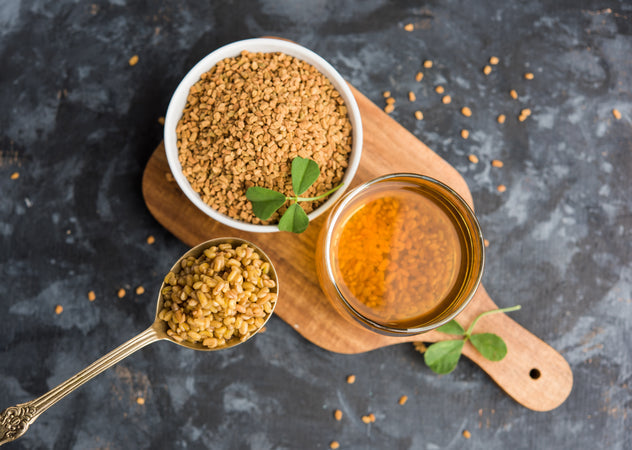
Peppermint Health Benefits: The Coolest Herb in Town
Written by Taylor Stewart, CHShare
As someone who has always struggled with digestive issues, peppermint has become an herb I consistently reach for and rely on. This cooling herb has been a beloved plant ally for centuries. The peppermint leaf benefits go way beyond its refreshing minty flavor. We're talking serious digestive support, brain-boosting power, and respiratory relief that'll make you wonder why you waited so long to invite this aromatic herb into your wellness routines.
Botanical Background
The peppermint plant (Mentha × piperita) belongs to the mint family and is actually a natural hybrid of water mint and spearmint. This herb thrives in moist, partially shaded environments across Europe and North America.
Identifying peppermint:
- Distinctive square stems
- Serrated dark green leaves
- Signature purple flower spikes that bloom in late summer
What makes this member of the genus mentha so special? It's all about the plant's unique ability to produce high concentrations of menthol and other essential oil compounds, which create both the cooling properties and the therapeutic benefits we know and love.
From Ancient Egypt to The Modern Kitchen
Ancient Egyptian medical texts dating back to 1550 BC reveal peppermint's use for digestive ailments, while Roman naturalist Pliny the Elder documented its applications in healing rituals. The ancient Greeks believed peppermint's benefits helped clear the throat and even stop hiccups. In both Greek and Roman households, it was often served after meals to support digestion, and would sometimes be added to milk to help keep it fresh. Centuries later, during the Victorian era, peppermint was mixed into hot water and used when washing floors, as it was believed to cleanse away negative energy.
Traditional Uses Across Cultures
Native American healers used fresh peppermint leaves to create therapeutic loose-leaf tea preparations and poultices. Traditional healers across cultures consistently identified key applications for this powerful aromatic herb, highlighting its potential health benefits:
- Digestive support for abdominal and stomach discomfort.
- Respiratory relief for breathing difficulties and sinus congestion.
- Eases tension in the head and neck.
- Mental clarity enhancement for focus and alertness.
This rich historical foundation explains why peppermint has earned its reputation as a trusted herbal ally and remains popular today. Not only is this herb a delicious addition to hot chocolate, but it also offers profound support for multiple body systems, backed by both tradition and science.
Explore The Science
Peppermint’s magic comes from a bouquet of naturally occurring plant compounds that create its unmistakable scent, cooling sensation, and time-honored wellness support. Researchers have studied peppermint for its free radical scavenging properties and its ability to help the body maintain balance in the face of occasional stress.
Some of peppermint’s key constituents include:
- Menthol – Responsible for peppermint’s refreshing chill, menthol helps open the senses and can soothe occasional digestive upset by gently relaxing the stomach.
- Rosmarinic acid – A plant compound valued for its antioxidant properties, supporting the body’s natural defenses and a healthy inflammatory response.
- Menthone – Adds to peppermint’s signature aroma and plays a role in its traditional use for easing digestive discomfort.
- Limonene – Found in peppermint’s essential oil, this citrus-like compound is uplifting and often appreciated in aromatherapy for its calming and mood-brightening qualities.
Together, these compounds contribute to peppermint's long-standing reputation as both a comforting herb and a refreshing botanical ally.
Digestive Wellness
From kitchens to apothecaries, peppermint has always had a knack for bringing comfort after a meal. This cooling herb is treasured not only for its refreshing flavor but also for the way its natural oils can ease the occasional digestive hiccup. By helping the stomach and digestive tract relax, peppermint offers gentle support when cramping, bloating, or gas get in the way of feeling your best.
- Encouraging stomach relaxation – helping to soften occasional tension and support natural digestive flow.
- Promoting comfort after meals – carminative properties can ease feelings of bloating and excess gas.
- Supporting bile flow – assisting the body in breaking down fats for smoother digestion.
- Offering antispasmodic activity – traditionally used to calm minor digestive spasms.
Herbalist tip: A warm cup of caffeine-free peppermint tea about 20 minutes after eating can be a simple ritual to settle the stomach. For more concentrated support, WishGarden’s Digestive Rescue tincture blends peppermint with a team of complementary herbs designed to help the body find digestive ease when you need it most.
Brain Fog Be Gone
Studies conducted at Northumbria University have shown that drinking peppermint tea can boost memory retention and sharpen focus. Research suggests that applying peppermint oil or drinking peppermint tea supports cognitive function by increasing oxygen flow to the brain. Additionally, it supports neurotransmitter activity that improves memory formation and battles mental fatigue through aromatic compounds that energize without overstimulation. The naturally caffeine-free nature of peppermint makes it an ideal choice for maintaining sustained mental clarity throughout your day.
Breathe Easy
Peppermint’s unmistakable coolness doesn’t just wake up the senses. It can also bring a feeling of openness and ease to the breath. The aromatic oils in peppermint have been traditionally used to relax the airways and encourage clearer breathing, especially during times of seasonal discomfort. Its naturally refreshing compounds also help freshen the mouth while supporting the body’s defenses against everyday environmental stressors.
Head Tension Relief Without the Side Effects
Clinical trials suggest that peppermint oil can provide head tension relief comparable to conventional options. Peppermint relaxes tight muscles in the head, neck, and shoulders that contribute to tension, while providing a cooling sensation that interrupts pain signals to the brain and supports a healthy inflammatory response.
The rosmarinic acid and menthol work together to relax tense muscles and ease symptoms naturally, offering targeted relief without systemic side effects. This also makes it a potentially supportive herb for menstrual cramps.
How to Use Peppermint
- Tea: Steep peppermint leaves for a gentle, calming ritual.
- Tincture: Concentrated liquid extracts that provide quick absorption and potent effects.
- Essential oil: Concentrated aromatic compounds for topical use or aromatherapy.
Topical Oil Applications
When applying peppermint oil, always dilute it with a carrier oil using a ratio of a few drops per tablespoon. Always perform a patch test, never apply undiluted essential oil directly to skin, and keep peppermint oil away from eyes and mucous membranes.

Peppermint Recipes Worth Trying
Ultimate Digestive Tea
- Combine 1 tsp dried peppermint leaf, 1 tsp dried catnip, and 1 tsp dried chamomile in a tea infuser or tea bag.
- Pour hot water (190°F) over herbs and steep for 5-7 minutes.
- Strain, add honey if desired, and sip slowly for digestive comfort.
Cooling Head Tension Relief Roll-On
- Add 9.5 mL of carrier oil to a 10 mL amber glass roller bottle.
- Include 2 drops of peppermint essential oil and 1 drop of lavender essential oil.
- Cap tightly, shake gently, and test on a small area of skin first before rolling onto temples, back of neck, or across forehead. Gently massage for better absorption. Keep away from the eyes and do not ingest.
WishGarden Formulas With Peppermint
- Digestive Rescue: Fast-acting herbs for digestive harmony before, during, or after meals.
- Digestive Rescue for Kids: Supports healthy digestion and soothes common discomforts in children.
- Colic Ease: Crafted for newborns to support a healthy GI tract and soothe infant gas.
- Congestion Rescue for Kids: Supports throat and respiratory comfort for children.
- Chlorophyll & Friends: Boosts overall well-being with phytonutrients, vitamins, and minerals.
- Gum Strength: Promotes gum and tissue health.

Safety Considerations
Peppermint can interact with how your body processes certain medications, particularly those metabolized by the liver. If you're taking prescription meds, especially antacids, diabetes medications, or liver-processed drugs, consult your healthcare provider. Peppermint is not recommended during pregnancy and should be used under practitioner supervision while breastfeeding.
Frequently Asked Questions About Peppermint
Is peppermint safe for daily use?
For most healthy adults, drinking peppermint tea daily is safe and enjoyable. However, those on certain medications or with reflux should consult healthcare providers first. Essential oils should be diluted and used sparingly.
Can children use peppermint products safely?
Peppermint tea in small amounts is safe for children over age two. Essential oils require caution and should not be used on infants under six months.
What’s the difference between peppermint oil and peppermint extract?
Peppermint oil is concentrated and therapeutic, while peppermint extract is gentler and used mainly for culinary purposes.
Are there benefits to peppermint oil capsules?
Yes, they may support digestive comfort, though research is ongoing. Choose reputable sources and seek professional guidance.
Can peppermint be used as a mouth rinse?
Yes, diluted peppermint rinses can freshen breath, but avoid swallowing and discontinue if sensitivity occurs.
Living in 'Mint' Condition
All together, these qualities remind us why peppermint has stood the test of time. It is a plant that brings immediate refreshment while also supporting daily wellness in gentle, reliable ways. Whether you sip it in tea, breathe in its aroma, or reach for a liquid extract, peppermint shows up as both a comfort and a companion for everyday vitality.
Taylor Stewart studied herbal medicine through PrairieWise Herbal School and The Herbal Academy. She’s passionate about sharing the gifts of plant medicine and how herbs can help us live more in tune with our bodies. She is the Practitioner Sales Specialist and a Customer Journey Representative at WishGarden Herbs.
For educational purposes only. This information has not been evaluated by the Food and Drug Administration. This information is not intended to diagnose, treat, cure, or prevent any disease, or to sell any product.





















